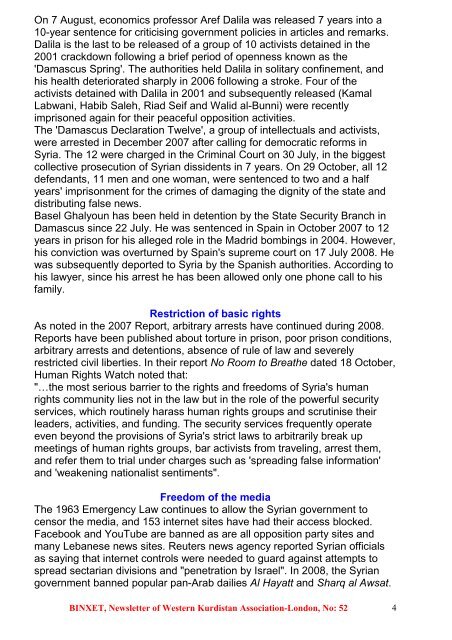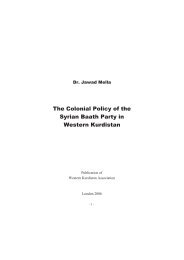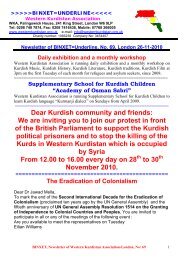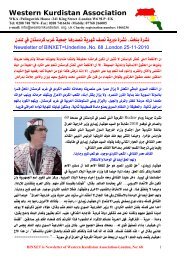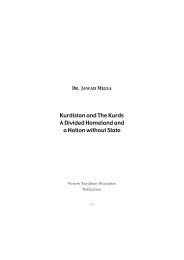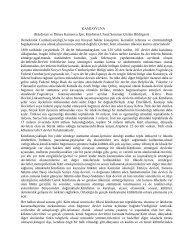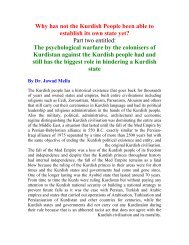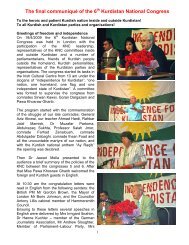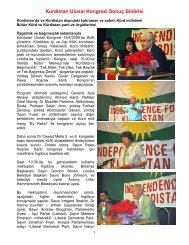(WKA) Newsletter 15/04/2009 (in English) - Dr Jawad Mella's Website
(WKA) Newsletter 15/04/2009 (in English) - Dr Jawad Mella's Website
(WKA) Newsletter 15/04/2009 (in English) - Dr Jawad Mella's Website
You also want an ePaper? Increase the reach of your titles
YUMPU automatically turns print PDFs into web optimized ePapers that Google loves.
On 7 August, economics professor Aref Dalila was released 7 years <strong>in</strong>to a<br />
10-year sentence for criticis<strong>in</strong>g government policies <strong>in</strong> articles and remarks.<br />
Dalila is the last to be released of a group of 10 activists deta<strong>in</strong>ed <strong>in</strong> the<br />
2001 crackdown follow<strong>in</strong>g a brief period of openness known as the<br />
'Damascus Spr<strong>in</strong>g'. The authorities held Dalila <strong>in</strong> solitary conf<strong>in</strong>ement, and<br />
his health deteriorated sharply <strong>in</strong> 2006 follow<strong>in</strong>g a stroke. Four of the<br />
activists deta<strong>in</strong>ed with Dalila <strong>in</strong> 2001 and subsequently released (Kamal<br />
Labwani, Habib Saleh, Riad Seif and Walid al-Bunni) were recently<br />
imprisoned aga<strong>in</strong> for their peaceful opposition activities.<br />
The 'Damascus Declaration Twelve', a group of <strong>in</strong>tellectuals and activists,<br />
were arrested <strong>in</strong> December 2007 after call<strong>in</strong>g for democratic reforms <strong>in</strong><br />
Syria. The 12 were charged <strong>in</strong> the Crim<strong>in</strong>al Court on 30 July, <strong>in</strong> the biggest<br />
collective prosecution of Syrian dissidents <strong>in</strong> 7 years. On 29 October, all 12<br />
defendants, 11 men and one woman, were sentenced to two and a half<br />
years' imprisonment for the crimes of damag<strong>in</strong>g the dignity of the state and<br />
distribut<strong>in</strong>g false news.<br />
Basel Ghalyoun has been held <strong>in</strong> detention by the State Security Branch <strong>in</strong><br />
Damascus s<strong>in</strong>ce 22 July. He was sentenced <strong>in</strong> Spa<strong>in</strong> <strong>in</strong> October 2007 to 12<br />
years <strong>in</strong> prison for his alleged role <strong>in</strong> the Madrid bomb<strong>in</strong>gs <strong>in</strong> 20<strong>04</strong>. However,<br />
his conviction was overturned by Spa<strong>in</strong>'s supreme court on 17 July 2008. He<br />
was subsequently deported to Syria by the Spanish authorities. Accord<strong>in</strong>g to<br />
his lawyer, s<strong>in</strong>ce his arrest he has been allowed only one phone call to his<br />
family.<br />
Restriction of basic rights<br />
As noted <strong>in</strong> the 2007 Report, arbitrary arrests have cont<strong>in</strong>ued dur<strong>in</strong>g 2008.<br />
Reports have been published about torture <strong>in</strong> prison, poor prison conditions,<br />
arbitrary arrests and detentions, absence of rule of law and severely<br />
restricted civil liberties. In their report No Room to Breathe dated 18 October,<br />
Human Rights Watch noted that:<br />
"…the most serious barrier to the rights and freedoms of Syria's human<br />
rights community lies not <strong>in</strong> the law but <strong>in</strong> the role of the powerful security<br />
services, which rout<strong>in</strong>ely harass human rights groups and scrut<strong>in</strong>ise their<br />
leaders, activities, and fund<strong>in</strong>g. The security services frequently operate<br />
even beyond the provisions of Syria's strict laws to arbitrarily break up<br />
meet<strong>in</strong>gs of human rights groups, bar activists from travel<strong>in</strong>g, arrest them,<br />
and refer them to trial under charges such as 'spread<strong>in</strong>g false <strong>in</strong>formation'<br />
and 'weaken<strong>in</strong>g nationalist sentiments".<br />
Freedom of the media<br />
The 1963 Emergency Law cont<strong>in</strong>ues to allow the Syrian government to<br />
censor the media, and <strong>15</strong>3 <strong>in</strong>ternet sites have had their access blocked.<br />
Facebook and YouTube are banned as are all opposition party sites and<br />
many Lebanese news sites. Reuters news agency reported Syrian officials<br />
as say<strong>in</strong>g that <strong>in</strong>ternet controls were needed to guard aga<strong>in</strong>st attempts to<br />
spread sectarian divisions and "penetration by Israel". In 2008, the Syrian<br />
government banned popular pan-Arab dailies Al Hayatt and Sharq al Awsat.<br />
BINXET, <strong>Newsletter</strong> of Western Kurdistan Association-London, No: 52 4


